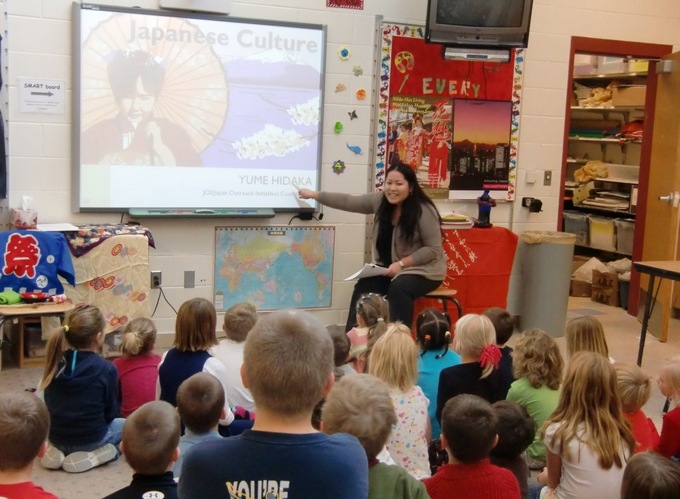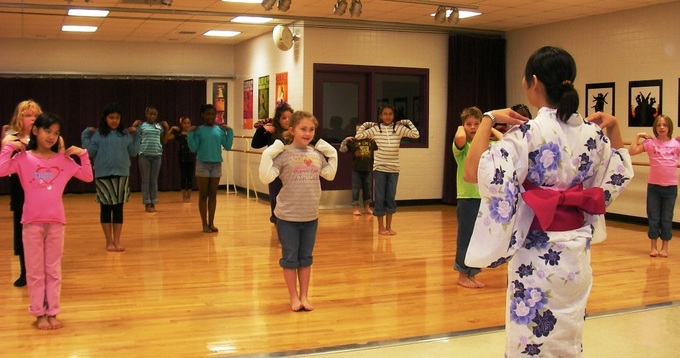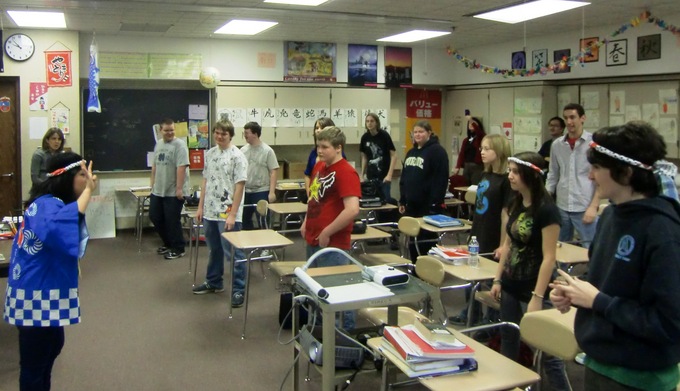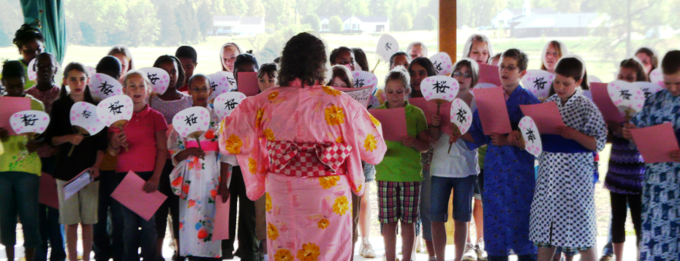"What Language is Spoken in Japan?"--Grassroots Interchange Ambassadors in the United States
Ayusa Koshi
The Japan Foundation Center for Global Partnership
Do you know what a JOI coordinator is?
The Midwest and Southern regions of the United States have relatively little interchange with Japan. To help people in those regions know about and better understand Japanese culture, the Japan Foundation Center for Global Partnership dispatches JOI (Japan Outreach Initiative) coordinators there. The coordinators have a two-year term. They visit educational institutions from elementary to university levels, libraries and community centers to introduce various aspects of Japanese culture, including daily life, traditional arts and the language. A total of 32 JOI coordinators have been dispatched so far. Five members of the eighth cycle of the program and four members of the ninth cycle are currently working in their designated areas.
At times, people get their first taste of Japanese culture
In the 1990s, a growing number of Japanese companies began expanding into the Midwest and South, and people there have since become more interested in Japan. However, the Japanese festivals and restaurants that are common on the U.S. East and West Coasts are scarce in these regions. Japanese language classes are also few in number, and it can be said that interchange with Japan is rather limited.
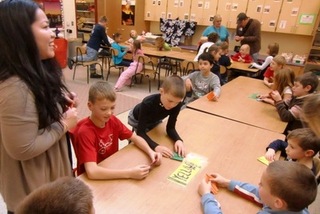 As a result, JOI coordinator is often the first Japanese the people in these regions meet. The children don't seem to understand that Japan is a single country, and ask questions like, "Where's Japan?" and "What language do they speak?"
As a result, JOI coordinator is often the first Japanese the people in these regions meet. The children don't seem to understand that Japan is a single country, and ask questions like, "Where's Japan?" and "What language do they speak?"
The coordinators mainly visit schools and community centers. They give demonstrations of shodo (calligraphy) and sado (tea ceremony), talk about student life and social problems in Japan and hold cooking classes for housewives. At times, they also hold workshops for Japanese language teachers and visit companies to lecture on Japanese business etiquette. They strive to organize events of different themes and content for people from children to adults and from those interested in Japan to those without any knowledge of it.
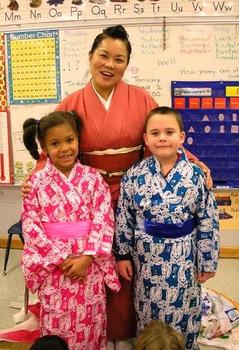 Creating new forms of interchange by coming up with their own ideas
Creating new forms of interchange by coming up with their own ideas
JOI coordinators are required to be able to bring people together and to have the creativity and ingenuity to create new things. They must coordinate all those things when they plan and run classes or events to inform people about Japan. Events related to Japan have never been held in most of the areas they are sent to, and there is hardly any regional network or operational know-how in place. Under the circumstances, though, they try to increase points of contact between the region and Japan so that the local people will continue to hold events on their own after the coordinator's two-year term is over. The coordinators are expected to act in ways that they think are appropriate.
For example, they come up with proposals for visiting lectures and events related to Japan on their own or get people to provide a part of their lesson time. Teaching materials and funds are limited, so some coordinators bring their own hand-made maps of Japan or hiragana flashcards with them. They also plan fashion shows or Japanese festivals, and get in touch with teachers and students from schools, librarians and other local people to create a single event.
This is the reason they are called "coordinators." The JOI coordinators do not carry on their activities single-handedly. Rather, they fulfill their mission with the support of people in the local communities. Each of the activities might last for a single session and be for a group of dozens of people. But seemingly trivial experiences like being taught how to fold origami at school by a Japanese person or writing your own name with a brush and ink may be an opportunity for people to know Japan and to become familiar with it, which will eventually stimulate interchange between Japan and the U.S.
Anyone can apply using their skills or hobbies
Regardless of age or work history, anyone can apply to become a JOI coordinator as long as they are a university graduate. Not all the coordinators who have been dispatched so far have profound knowledge of Japanese language teaching or traditional arts. Everyone makes use of their skills and hobbies and gathers information in the area to plan original classes and events. The coordinators of the eighth and ninth cycles of the JOI program who are currently active are greatly sought after by schools and communities everywhere.
The JOI coordinators--the "grassroots interchange ambassadors"--are striving to be a bridge between Japan and the U.S. at the grassroots level.
The Japanese Student Disaster Relief Scholarship Program by the University of Arkansas - Fort Smith
The University of Arkansas - Fort Smith (U.S.), where a coordinator from the eighth cycle of the Center for Global Partnership's JOI program is currently based, has decided to provide Japanese university or junior college students affected by the Great East Japan Earthquake with relief scholarships.
http://www.jpf.go.jp/cgp/e/index.html
http://www.uafs.edu/News/news?storyid=3012
JOI program
The Laurasian Institution (co-sponsoring organization)
Keywords
Back Issues
- 2026.1.23 Weaving Memories of …
- 2026.1. 6 How Japanese-Languag…
- 2025.12.25 Peace Actions Envisi…
- 2025.9.30 The 51st Japan Found…
- 2025.9.30 The Japan Foundation…
- 2025.9.30 Bringing the World C…
- 2025.9.30 The 51st (2024) Japa…
- 2025.9.30 Japan Foundation Pri…
- 2025.9.30 Japan Foundation Pri…
- 2024.5.24 The 50th Japan Found…


